Top Picks for Nutritious and Safe Options

Why Choose Organic?
As a parent, you want to ensure that your baby receives the best possible nutrition. Organic baby food is now a safe and natural choice, free from artificial preservatives, pesticides, and GMOs that help a parent become confident about the food that they are providing for their babies and, by extension, their growth and development.
Best Organic Baby Food This guide examines the best candidates in organic baby foods and what makes these food products a notch above the others. It includes products that are suitable for every age and budget and palate: safe and healthy for baby and good for nutrition.
These are the key factors to keep in mind when choosing organic baby food.
Always look past the “organic” label, taking other factors such as ingredients, nutrition, certifications, and the baby’s age into consideration.
Construct an evidenced rationale based on knowledge of ingredients and nutritional value.
Organic baby food must have simple, whole ingredients with minimum to no processing. The primary ingredient should be made from real fruits, vegetables, and whole grains and contain no added sugars, salts, or fillers. Nutritious ingredients will contribute to the health of the baby’s brain; therefore, it is always good to check the labels for fiber, vitamins, and minerals. Best Organic Baby Food
Certifications to Look For USDA Organic, Non-GMO
There is no doubt that USDA Organic and Non-GMO Project Verified food are quality seals. USDA organic certification means that the product adheres to organic standards set by the Federal Government and does not contain synthetic fertilizers and pesticide residues. Non-GMO certification ensures that whatever reaches the grocery shelf contains no genetically modified organisms.
Age-Appropriate Stages of Baby Food
Best Organic Baby Food As babies grow up, the food needs change. Organic baby food is usually staged along the course of this development:
Stage 1: Is a pureed, single-ingredient baby food stage that is advised for 4-6 months.
Stage 2: Simple blends or a first introduction of new tastes, usually at 6-8 months.
Stage 3: Complex choices fresh with chunkier textures for babies aged 9+ months.
Top Picks for Nutritious and Safe Options
The large organic baby food brands combine taste and health together nearly flawlessly. All the products carry the organic certification logo and are based on the perfect fulfilment of the baby’s nutritional needs.
1. Serenity Kids organic pouch baby food.
Ingredients include Grass-Fed Raised Pasture-Grazed Meat. Include organic vegetables and remove fillers and artificial sugars. Proteins, healthy fats, and some complex carbs.
Flavor Variety and Options: The beneficial blends contain any combination of beef, carrot, and spinach.
Advantages and Disadvantages:
Pros: Very protein-rich and free of usual allergens. Fairly expensive.

2.Happy Family Organics Stage 2 Baby Food
They are mainly classified in two groups: nutritional profile: Happy Family Organics blends fruits, vegetables, and grains into a balanced organic integrated diet beyond USDA certification. No added sugar. Best Organic Baby Food
Flavors and varieties: Sweet Potato & Pumpkin Blend and Banana & Blueberry Blend.
Pros: Sweet, smooth; convenient; economical.
The main cons: Only a few choices of protein percentage. Best Organic Baby Food
Earth’s Best Organic Baby Food
Nutritional highlights: Earth’s Best is one of the more established ones for wholesome organic food based on newer standards tested more rigorously than any other. Best Organic Baby Food
There is flavor variety and options: Stage One single ingredient purees, or Stage Two multi-ingredient blends such as pear, peach, apple, or carrot, sweet potato.
Pro- cheap; everywhere available.
Con- some blends are fruitier and not every baby will enjoy them.
4.Once Upon a Farm Cold-Pressed Organic Baby Food
Best Organic Baby Food Nutritional highlights: A cold-pressed organic baby food, completely free from preservatives and naturally fresh and dense in nutrients.
Flavor variety and options: Avocado, mango & mint, blueberry, banana & sweet potato, with some really exotic flavors.
Advantage: No preservatives are included; the raw nutrients are allowed to move into the baby’s mouth through cold water.
Disadvantage: Store in the refrigerator or cooler.
5. Yumi Organic Baby Food Subscription
Nutrition Highlights: Handcrafted meals for every developing stage of Yumi are prepared by chefs, then delivered to your front door each week.
Flavors and Options: Meals are curated according to seasonal ingredients and pediatricians’ recommendations.
Pros and cons:
Pros: Fresh, customizable delivery to your door.
Cons: Subscription-based, therefore likely to be considerably costly compared to store-bought options.
How to Introduce Organic Baby Food Safely
Best Organic Baby Food Safety in introducing organic baby food implies commencing with single-source purees and gradually incorporating complex blends. Some food-handling practices include:
Choose the Right Stage For Your Baby
Start Stage 1 purees at 4-6 months, as soon as your baby has started to accept some solids, and move on to Stage 2 and Stage 3 foods as your baby increases in solids tolerance. Go by what your baby tells you, and if unsure, do not hesitate to consult your pediatrician.
Introducing New Flavors Gradually
Each new food should be introduced every few days so that a reaction can be monitored. Doing this ensures allergies are spotted and gives babies plenty of time to explore so that they can enjoy different tastes.
Freezing and Serving Organic Baby Food
In the name of safety, always heed storage instructions. Homemade organic baby food can be frozen in some small portions. Most pre-packaged varieties are shelf-stable, but be sure to refrigerate them after opening.
Homemade Organic Baby Food-Nutritious Approach
Many parents make their own organic baby food. This manner gives complete control over the ingredients; a whole lot of customization is possible. Best Organic Baby Food
Homemade Baby Food Recipes
Here are a few simple recipes to get you started:
Classic Mashed Banana Puree: An overripe organic banana mashed and served on its own.
Organic Sweet Potato Puree: Steamed and mixed organic sweet potatoes into a creamy dish.
Creamy Avocado Puree: Mash an organic avocado and smoothen it with water or breast milk.
Saves Money and Controls Ingredients
Organic baby food made at home is environmentally friendly and can be stored in freezer-safe containers for easy meals during the week.
Benefits of Making Organic Baby Food at Home
Cost Savings: Making baby food can be a lot less expensive than buying pre-packaged options, particularly if you buy in bulk.
Complete Control Over Ingredients: Making your baby food means no fillers, no added sugars, and no questionable ingredients.

Questions and Answers on Organic Baby Foods
1. Is Organic Safe For An Infant?
Definitely! Commercial organic baby foods used lesser pesticide and synthetic residues to remain free from these remnants than other foods. Besides, organic baby food has been proven to regularly contain more bioavailable nutrients, which means nutrients available for absorption by the body.
2. What Are the Leading Organic Baby Food Brands?
Some of the top performers in this field include Serenity Kids, Happy Family Organics, Earth’s Best, Once Upon a Farm, and vibrant Yumi.
3. What does Organic stand for baby food?
Products will be regarded as organic if they are USDA Organic certified, and also obtain non-GMO Project verification.
4. When Should I Start Organic Baby Food for My Baby?
Baby food should preferably be introduced not earlier than 4-6 months, or according to the age of a baby, allowing the infant to get used to solid food.
5. Is Mixing Homemade Organic Baby Food with Store-Bought Okay?
Many parents do this throughout the world, as it is much more convenient and varied when feeding their babies.
Table of Contents
Conclusion
Choosing the Best Organic Baby Food for Your Baby’s Health
Going with organic baby foods is a wise way to secure your child clean, nutrient-rich foods, without harmful chemicals. Best Organic Baby Food No matter if you choose store-bought or homemade options, what matters the most is that your baby is getting right nutrition for growth and development.
Best organic baby food options from Serenity Kids, Happy Family Organics, and other trusted brands give parents safe and nutritious options for every stage of their babies’ lives. Best Organic Baby Food
If you’re wondering what the best organic baby food is, rest assured that feeding your little one this level of nutrition is a choice you can feel good about. Organic baby food provides clean, whole food nutrition, free of pesticides, chemical additives and preservatives. Organic products are pure and of high quality, delivering nourishing ingredients to your baby from day one.
Not only should they be nutritious, but also safe, tasty and easy to prepare – all of which are top priorities when seeking out the best organic baby food brands for your little one, so every meal can be practically as great for baby just like it is toward fresh. From fresh, organic produce and whole grains to pureed entrees, these life-stage foods are individually designed for both children before they grow teeth and those soon after.
Best Organic Baby Food And as a parent, you strive to make the most appropriate choices regarding your infant’s health and wellbeing. When you opt for organic, you are providing your baby with a solid start toward a lifetime of healthy eating habits. Organic baby food is not just a meal, it comes with assurance, trust and ethnicity behind each jar or box you open out there — and that says a lot as a parent.
Now you can give your baby the very best with such an abundance of trusted, high quality organic choices on the market! Why not take the plunge and start your babe out on the right foot with some great organic grub?

Pingback: Best Food Near Me 2024
Pingback: Best Top Organic Baby Food 2024